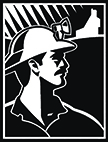
SOCIAL LIFE in a COMPANY TOWN
In the first two decades of the 20th century, nearly half of Gay’s population were immigrants who brought many traditions with them. In 1900, only two of the 104 people living in Sherman Township were not first- or second-generation immigrants. Early arrivals tended to be English and German; by 1910, most were French-Canadian and Finnish. In 1904, the two mills were in full operation. Mohawk and Wolverine Mining Companies laid out the streets, built worker houses, a school, the township hall, a doctor’s office, a store, and a park with playground equipment. Night classes held at the Gay School offered English as a second language.
A group of Mohawk Stamp Mill employees pose in front of the mill which began operations in 1902. Courtesy: MTU Archives.
When the Mohawk mill closed in 1932, some workers shifted into the service sector and into federal work programs. The new school, built in 1927, had six classrooms on two floors, eight staff members, and housed the town library. Fishing and lumbering, once small industries, began to grow in importance.
Gay was a classic company town. Social life in Gay centered around the school, dances and parties in the township hall, baseball, and picnics in the park. When Copper Range Railroad extended passenger service between Calumet and Gay to Sundays, travel for social events increased. Picnics, fundraisers, baseball games, and visiting other parts of the Keweenaw increased for Gay residents. Even amidst the Copper Country’s 1913 copper miners’ strike, residents and visitors gathered for festivals and fundraisers to build their first and only church—a French-Canadian Catholic church. The Finnish families rotated their services and worshiped in individual homes. The mining companies hosted an annual 4th of July event in the park at Gay.
Many families moved away during the decades after the mill closed to seek other employment. Yet the shared cultural heritage in this company town attracted the children from some of these families to return as retirees and live in Gay. The school closed in 1961 and it reopened as a museum in 2012. The township maintains the offices for Sherman Township and a community hall for social events.
The first school in Gay was built in 1902 to meet the needs of the families working at the mills. It became overcrowded and a new, six room, two story building was built in 1927. Continuing education was available in nearby communities. The school continued to be a center of community life after the mills closed in 1932. By 1959 only 25 students attended the school, and it was closed in 1961.
Courtesy: Gay Museum.
The 1907 Gay Baseball team won the Keweenaw League pennant. They were League champions for three years.
Courtesy: Gay Museum



